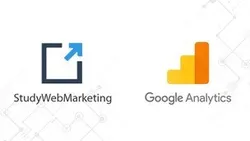
Google Analytics Basics For Beginners Free -2018 
This free course provides beginners with the basics of Google Analytics, including setup, key concepts, and reporting. Learn how to use this powerful tool to make a difference in your career or business. ▼
ADVERTISEMENT
Course Feature
![]() Cost:
Cost:
Free
![]() Provider:
Provider:
Udemy
![]() Certificate:
Certificate:
Paid Certification
![]() Language:
Language:
English
![]() Start Date:
Start Date:
On-Demand
Course Overview
❗The content presented here is sourced directly from Udemy platform. For comprehensive course details, including enrollment information, simply click on the 'Go to class' link on our website.
Updated in [April 29th, 2023]
Welcome to Google Analytics Basics For Beginners Free -2018! This course is designed to help you understand the fundamentals of Google Analytics and how to use it to gain insights and build custom reports. You will learn how to set up a Google Analytics account, understand the reports, gain insights, and build custom reports to advance your career or business.
In this course, you will have access to a model account for reference, a demo account with real life data, and real life examples. You will also learn about Google Analytics report types, custom reports, and key concepts. With the help of a Google Top Contributor, you will not only learn Google Analytics, but also understand it with real life examples and access to Google Analytics Power tools.
Course Overview: This course provides an overview of the fundamentals of Google Analytics and how to use it to gain insights and build custom reports.
Possible Development Directions: With the help of a Google Top Contributor, you will not only learn Google Analytics, but also understand it with real life examples and access to Google Analytics Power tools.
Related Learning Suggestions: After completing this course, you can further your knowledge by exploring more advanced topics such as Google Analytics Audience Reports, Google Analytics Acquisition Reports, and Google Analytics Behavior Reports. You can also learn more about Google Analytics Power tools and how to use them to gain insights and build custom reports.
[Applications]
Upon completion of this course, students can apply their knowledge of Google Analytics to their own businesses or careers. They can use the skills they have learned to set up their own Google Analytics accounts, understand the reports, gain insights, and build custom reports. Additionally, they can use the real life examples and model accounts to gain a better understanding of Google Analytics and its key concepts. Finally, they can use the Google Analytics Power tools to further their knowledge and expertise.
[Career Paths]
1. Digital Marketing Analyst: Digital marketing analysts are responsible for analyzing data from various digital marketing channels, such as search engine optimization (SEO), pay-per-click (PPC) campaigns, and social media. They use Google Analytics to track and measure the performance of these campaigns, and to identify areas for improvement. The role is becoming increasingly important as businesses look to maximize their return on investment from digital marketing activities.
2. Web Developer: Web developers use Google Analytics to track and measure the performance of websites. They use the data to identify areas for improvement, such as page speed, user experience, and content optimization. As the demand for web developers continues to grow, the ability to use Google Analytics to optimize websites is becoming increasingly important.
3. Data Scientist: Data scientists use Google Analytics to analyze large datasets and uncover insights. They use the data to identify trends, develop predictive models, and make data-driven decisions. As businesses become increasingly data-driven, the demand for data scientists with Google Analytics skills is growing.
4. Digital Strategist: Digital strategists use Google Analytics to develop and implement digital strategies. They use the data to identify opportunities, develop plans, and measure the success of their strategies. As businesses look to maximize their return on investment from digital activities, the role of the digital strategist is becoming increasingly important.
[Education Paths]
1. Bachelor of Science in Business Analytics: This degree program focuses on the application of data analytics to business decision-making. Students learn to use data to identify trends, develop strategies, and optimize operations. This degree is becoming increasingly popular as businesses recognize the value of data-driven decision-making.
2. Master of Science in Data Science: This degree program focuses on the development of data-driven solutions to complex problems. Students learn to use data to develop predictive models, identify patterns, and develop insights. This degree is becoming increasingly popular as businesses recognize the value of data-driven solutions.
3. Master of Science in Artificial Intelligence: This degree program focuses on the development of intelligent systems that can learn from data and make decisions. Students learn to use data to develop algorithms, build models, and create intelligent systems. This degree is becoming increasingly popular as businesses recognize the value of artificial intelligence.
4. Doctor of Philosophy in Data Science: This degree program focuses on the development of advanced data-driven solutions to complex problems. Students learn to use data to develop predictive models, identify patterns, and develop insights. This degree is becoming increasingly popular as businesses recognize the value of data-driven solutions.
Pros & Cons

Much better than paid courses

Interactive and informative

Good overview of GA

Very good

Helpful tutorial

Not updated with GA4

Low voice quality

Strange accent

Confusing English
Course Provider

Provider Udemy's Stats at AZClass
Discussion and Reviews
0.0 (Based on 0 reviews)
Explore Similar Online Courses

Content Marketing Strategy Trends for 2020

Pharmacology & Cardiovascular Health

Skillshare Course Marketing

The Six Ways To Make Money Online

Find and Close Clients for Social Media Marketing FAST

Create A Professional Online Presence Course - FutureLearn

Complete Twitch Streaming Tutorial Series: PS4 Xbox One PC

Social Media Optimization & Automation with HootSuite

Free Interview Practical Guide for Social Media Marketing

Chatfuel: The Complete Guide to Messenger Bots for Business

Using Social Media for Business - Online Course


Start your review of Google Analytics Basics For Beginners Free -2018